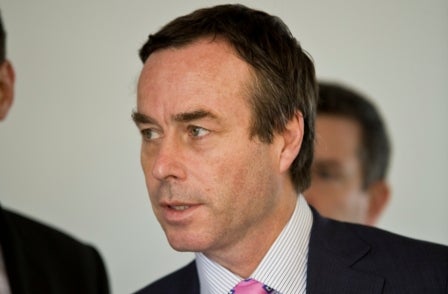
Financial Times editor Lionel Barber has warned that national newspapers are “in the last chance saloon, drinking our last pint’following the News of the World phone-hacking scandal.
Appearing before the Leveson Inquiry this morning, Barber said the PCC‘s handling of the phone-hacking allegations at the NoW was a ‘serious misstep’that resulted in the watchdog ‘losing credibility”.
He agreed when Lord Justice Leveson questioned whether the PCC was really a regulator at all or simply a ‘complaints mechanism”.
‘I think we need a new body, we need a new composition… and we need new powers,’said Barber.
He claimed that for too long the PCC had been dominated by insiders and that any new regulator would need to bring outsiders in so that it avoided looking like a ‘cosy stich-up”.
When Barber, who has worked at the FT for 26 years, said national newspapers were ‘in the last chance saloon, drinking our last pint”, Leveson replied: ‘That was 20 years ago”, a reference to comments made by former cabinet minister David Mellor following an inquiry by Sir David Calcutt that saw the PCC’s forerunner the Press Council scrapped.
‘This has been a real shock, what happend at the NoW,’responded Barber.
‘Not just in terms of the of the extent, the industrial scale of phone-hacking, but the pattern of lies and also the result, which was shocking – the closure of a national newspaper with a circulation of several million.
‘And a newspaper that’s actually done over the years, some very good stories.”
‘Shocking episode’
He added: ‘This was a shocking episode and all of us… believe that as a result we need to change the way we do business. If this isn’t a wake-up call I’m not sure what is.”
Leveson told Barber that there had been similar wake-up calls in the past but that ‘everybody’s woken up and then it all just appears to have drifted off again”.
Barber, who replaced Andrew Gowers as editor in 2005, argued that in the event of serious breaches of the code newspapers should be fined and forced to publish apologies ‘very prominently according to the seriousness of the mistake”.
“It’s a deterrent – don’t underestimate the significant of that,’he said.
As well as having the powers to investigate allegations of wrongdoing, the industry also needed to ensure that every paper comes under the remit of the press regulator.
This should not be achieved by statute, believes Barber, but by creating the ‘best possible, and most credible, and most robust form of self-regulation, which is so good that everybody wants to be part of it”.
But Barber also said the Editors’ Code needed to be enforced before it’s ‘substantially amended”.
Commenting on the paper’s own internal controls, he said the FT ‘should be the gold standard in journalism”, and that its code of conduct was ‘a model for self-regulation”.
‘I’d rather be right than first’
Barber, who spent 16 years as the FT’s foreign correspondent in Washington and Brussels, repeatedly stressed the importance of the paper’s minimum two-source policy.
‘If you rely on a single source you are leaving yourself open to manipulation,’he told the inquiry, claiming that even if one his journalists spoke with the Prime Minister off-the-record they would still speak with other sources to put the story in its broader context.
“Two sources is essential for the way we do our business… that’s a minimum, two sources, preferably we’d like three,” he said.
As an example, Barber described how on one occasion a source he had known for more than 10 years told him that the oil giant Shell was about to revise its policy on oil reserves.
The story was ‘absolutely correct’but could not be stood up, so Barber decided not to run it.
The following day the company confirmed the news in an announcement.
Barber said: ‘I’d rather be right than first. In fact not rather, that’s the way we operate. We don’t want to be first and get it wrong.”
He also revealed that the FT reviewed its internal sourcing policy after New York Times reporter Jayson Blair was sacked for plagiarism in 2003, claiming that ‘if you see the best in class suffering a scandal like that you need to react.”
Barber said he knew of ‘no instances of phone-hacking or so-called blagging’at the FT.
- To contact the Press Gazette newsdesk call 020 7336 5327 or email pged@pressgazette.co.uk
Email pged@pressgazette.co.uk to point out mistakes, provide story tips or send in a letter for publication on our "Letters Page" blog






